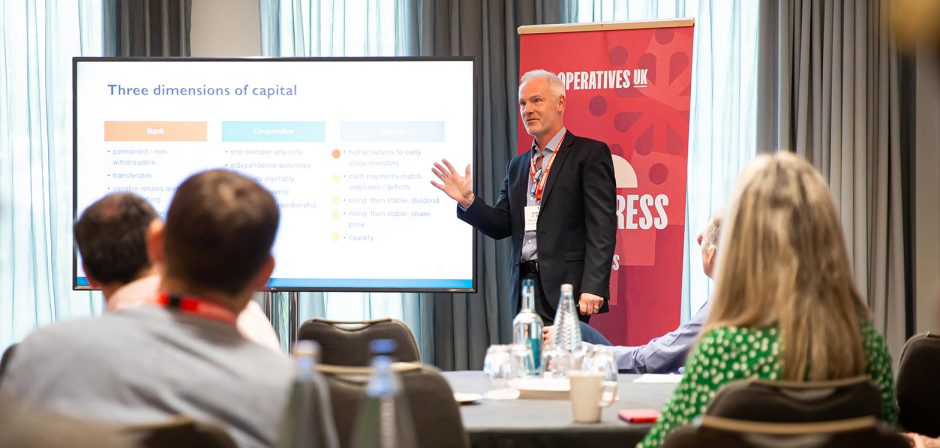The capital conundrum has plagued co-ops for decades: how can people wanting to set up member-owned organisations find the start-up capital they need when there is no – or very little – return for investors?
Community share offers, GoFundMe campaigns and grants go some way to addressing this, but not to the level required for a growing, robust co-op movement, particularly in highly regulated sectors such as banking.
At the 2022 UK Congress, held in Birmingham at the end of June, Tony Greenham of the Mutual Banks Association (MBA) and Cliff Mills of Anthony Collins Solicitors shared work they have been doing in this area: attempting to develop a new legal structure they hope will address some of the obstacles facing any attempt to set up a genuinely co-operative bank.
“The UK banking system is weird,” said Greenham. “It’s weird because it doesn’t have socially orientated local banks when almost everywhere in the world does. I’ve been trying to set one up … it’s turned out to be quite hard.”
Europe has 2,700 co-operative banks with 87 million members; the UK is the only G7 economy without them. This is a problem, said Greenham, because regional stakeholder banks deliver significant benefits. “They offer greater financial inclusion and do more small business and co-op economy lending. Where they exist there are smaller regional economic disparities – and they create more resilient economies.”

The MBA is a trade association – “without any members that are actually trading yet” – formed by Southwest Mutual, Avon Mutual and Bristol Mutual with support from the Esmée Fairbairn Foundation and Co-operatives UK.
Why are they calling it them ‘mutual banks’ rather than ‘co-operative’? “There are a couple of reasons,” said Greenham. “Firstly, the word ‘mutual’ is really familiar in financial services. And secondly, there’s a certain other UK bank with the word co-operative in its name, which is a bit confusing, because it isn’t one, and never was one. Actually, there never have been co-operative banks in this country in the way that have been elsewhere.”
Which Act to follow?
Most co-operatives in the UK are registered under the 2014 Co-operative and Community Benefit Society Act – but although there are some explicit provisions around banks, there are some serious problems when it comes to implementation in this sector. “The share capital that [banks] are allowed to use must be non-withdrawable and transferable,” said Greenham. “We can’t use community shares for a bank because it has to be a form of permanent capital.”
He added: “The real problem we found is that with an early stage start-up, we needed to attract initial investment, which is very risky. I raised a million pounds off investors who have had to take a massive punt and they quite possibly won’t get any of that money back.
Related: Preston Council agrees to join Liverpool and Wirral on regional mutual bank
“Then we’d need to raise about another £2-3m before even getting to the point where we could start trading with a banking licence. That’s also really risky money.
“You also can’t simply go along to that first crop of investors and say that they are going to get the same deal that the final investors are going to get, because nobody would invest in it. But the Financial Conduct Authority (FCA) has confirmed that the 2014 act doesn’t allow shares issued at different prices; they have to be issued at nominal value. That’s a massive barrier.”
The way the MBA tackled this barrier was to look at other registration options – specifically using the Companies Act while also attempting to be a full mutual. “My aspiration is that it would be recognised by the co-op movement as properly co-operative,” said Greenham.
He added that while financial institutions such as credit unions do good work, they “don’t really do business lending … they’re doing a different job from regional co-operative banks”.
A question of purpose
The next challenge was that if the Companies Act was used, how could someone make sure they didn’t end up with an organisation that defaults to maximising profit?

“We needed something which is clearly different and sets it apart,” said Mills, who specialises in constitutions and legal structures.
“The Companies Act defines the purpose of a company as for the benefit of the shareholders as a whole, and a duty to promote the success of the company, which is for the private benefit of shareholders.
“However, there is a subsection in the act which says if there is some other ‘purpose’, the duties of the directors are then to pursue that other purpose. So we’ve written into our purpose that it exists for the common good, not for the private benefit of its members. That changes the default setting of a company”.
If the directors’ duties are to promote the common good, how can they be held accountable by the members? MBA’s solution is to make it a multi stakeholder organisation which recognises that workers, customers and investors all have legitimate interest in its success.
The model proposes three classes of membership; only one of them, the investor shares, will actually be used for attracting capital, while the worker and customer shares are there to defer voting rights.
The next challenge was how to embed democratic governance in such an entity – when, by the regulator’s decree, the board must be selected for their skills in running a bank.
Related: Community mutual bank for Wales works toward launch
“There is no space for directly elected member representatives on the board at the moment,” said Greenham. “It might be possible in the future, but we’re trying to do a lot of new and regulators don’t like new.”
Their solution is to develop a members’ council system – 20 or so members elected in “a vibrant democratic process” that “get up close and personal with what their managers are doing, and hold them to account”.
Mills believes this is groundbreaking. “We’re creating a plc that will attract investment – but not for the purpose of maximising the benefit for those investors – because of this new purpose, and also because those investors will not have complete control as there are other member classes and it’s one member, one vote.”